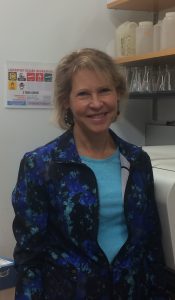Congratulations to Sharon Campbell who has been appointed the Gary F. Liebscher Distinguished Professor of Biochemistry and Biophysics, effective November 1.

The purpose of the Gary F. Liebscher Distinguished Professorship is to support a full-time member of the faculty in the Department of Biochemistry and Biophysics at the UNC School of Medicine specializing in the science, research and/or cures of either cancer or neurodegenerative disorders. Campbell received this professorship in support of her and research on small G-proteins that are implicated in lung, colorectal, pancreatic and other cancers.
Sharon Campbell is a professor in the Department of Biochemistry & Biophysics at University of North Carolina, Chapel Hill. Dr. Campbell received her MS and PhD in Chemistry from Yale University. After postdoctoral training in the departments of Biochemistry and Physics at Brandeis University, she became a research scientist at DuPont Central Research and Development. Her research efforts at DuPont led to solution structure determination of the Ras proto-oncoprotein by NMR spectroscopy. In 1994, she left to DuPont-Merck to become a faculty member at the University of North Carolina. As a junior investigator at UNC, Campbell received both the Jefferson Pilot and Hettleman awards. In 2014, she received the Hyman L. Battle Distinguished Cancer Research Award. Dr. Campbell currently consults with companies to develop Ras and focal adhesion kinase inhibitors, and is co-organizing an ASBMB sponsored international meeting in 2018 on Ras and a Small GTPase FASEB meeting in 2019.
Dr. Campbell’s structural and mechanistic studies of tumor promoter and tumor suppressor proteins at UNC have led to the identification of novel effector interactions and post-translational modifications that drive Ras-mediated tumorigenesis, and delineation of interactions critical for focal adhesion kinase and vinculin-mediated cell motility. Results from her studies on Ras, could provide the long-sought break-throughs necessary to turn mutant Ras proteins into druggable targets, which could provide improved treatment of multiple cancers.
Media contact: Carolyn M. Clabo, 919-962-7642, carolyn_clabo@med.unc.edu
